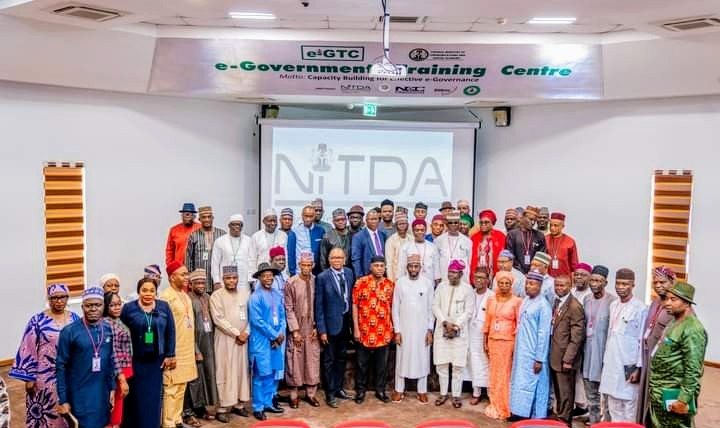The Director General of Nigeria’s National Information Technology Development Agency (NITDA), Kashifu Inuwa, CCIE, has stressed the importance of the security industry and, AI-Integration, the startup ecosystem working together to improve the country’s security.
During a meeting with Alhaji A. S. Adeleke, representing NISS, Inuwa made the following remarks, as reported by Deputy Commandant D. E. Egbeji. Those in attendance at the eGovernment Training Centre (eGTC) at the Public Service Institute of Nigeria (PSIN) in Kubwa, Abuja, as well as the Executive Intelligence Management Course (EIMC 17) with the topic “Artificial Intelligence, Security, and Emerging Economies in Africa: Challenges and Prospects”.
Read also: NITDA commits to leveraging AI for national security
The DG’s Assessments
Inuwa emphasised the revolutionary potential of cooperation to capitalise on opportunities presented by IT, such as the Internet of Things (IoT), Artificial Intelligence (AI), and other developing technologies to strengthen the security sector while highlighting the different approaches of the security and IT sectors.
Inuwa brought attention to artificial intelligence’s role in streamlining processes, providing instantaneous responses, and proposing viable alternatives to address the frequent misunderstandings that often occur. He distinguished three distinct types of artificial intelligence (AI), each with its own capabilities: narrow intelligence, general AI, and deep learning AI. Each of these types of AI possessed their own set of capabilities.
Reactive Machines, Limited Memory, Theory of Mind, and Self-Awareness are the four categories that expand on the capabilities of artificial intelligence, and Inuwa provided a comprehensive rundown of the capabilities and implications of each of these categories.
In response to the National Information Technology Development Authority’s (NITDA) commitment to bolster artificial intelligence (AI) in Nigeria, Inuwa lauded the National Centre for Artificial Intelligence and Robotics (NCAIR) as well as other projects. An AI policy for the nation is currently being developed.
While expressing openness to the possibility of strategic partnerships, Inuwa emphasised that these partnerships are in accordance with the Strategic Roadmap and Action Plan (SRAP 2.0) of the National Information Technology Development Authority (NITDA), specifically, the pillar that is centred on the formation of such alliances.
An executive brief that President Bola Ahmed Tinubu GCFR can use to guide policymaking is the objective of the institute, as stated by Commandant Alhaji A.S. Adeleke of NISS. The institute’s goal is to learn from the successes and failures of NITDA in order to facilitate the writing of the executive brief.
Dr. Aristotle Onumo, the Director of Corporate Planning and Strategy at NITDA, gave a thought-provoking presentation. In his presentation, he detailed the organisation’s history and its significant impact on the development of Nigeria’s information technology sector. This presentation demonstrated the organisation’s commitment to technological innovation.
NITDA now accepts applications for ‘DigitalforAll Challenge 2.0’
How AI can help the security sector
AI-driven analytics enable efficient threat detection by analysing large amounts of data from various sources, such as social media, communication intercepts, and surveillance footage. Artificial intelligence algorithms strengthen preventative security measures by recognising patterns and detecting anomalies.
Artificial intelligence (AI) is a strong defence against cyberattacks. Its strength is in its ability to detect malware quickly, respond quickly to cyber intrusions, and continuously monitor network activities. Biometric identification systems, which use artificial intelligence to improve the recognition of people based on their distinct physiological features, also contribute to improved border security and access control.
The data analysis capabilities of AI enable predictive policing, which optimises law enforcement strategies by identifying periods and hotspots for crime. By doing so, authorities can prevent criminal activities from getting out of hand by allocating resources ahead of time.
By combining data from various sensors, satellites, and drones, AI enables comprehensive situational awareness, which helps security personnel make informed decisions. Autonomous vehicles and robotic security systems supplement these initiatives by increasing the capacity for monitoring and response in dangerous areas.
Artificial intelligence (AI) can also help in crisis management and attack mitigation by evaluating social media feeds, emergency calls, and sensor data.
AI strengthens a nation’s security infrastructure and protects its citizens and vital assets by enhancing threat detection, cybersecurity, law enforcement, and emergency response.
















